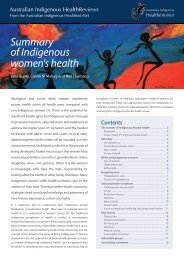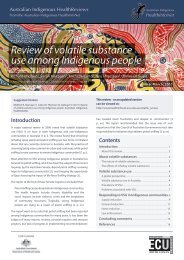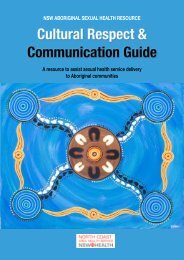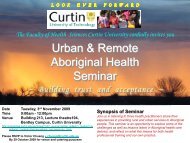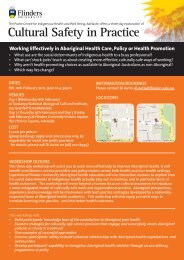hearing loss and the criminal justice system - Australian Indigenous ...
hearing loss and the criminal justice system - Australian Indigenous ...
hearing loss and the criminal justice system - Australian Indigenous ...
You also want an ePaper? Increase the reach of your titles
YUMPU automatically turns print PDFs into web optimized ePapers that Google loves.
Senate Inquiry March 2010_________________________________________________________________________________________________________________Steven, a man in his thirties, had a longst<strong>and</strong>ing <strong>hearing</strong> <strong>loss</strong>. In spite of his <strong>hearing</strong> <strong>loss</strong>,Steven held a senior position in his employment <strong>and</strong> had almost finished a law degree.Here, Steven describes his experience with <strong>the</strong> police.“I’ve been pulled up by police when I was younger <strong>and</strong> I was sort of mumbled out aresponse <strong>and</strong> <strong>the</strong>y say ‘Quit your mumbling, you know, blah, blah, blah’, start tomake fun of me, you know. And I’m still so offended, made me out to be some sortof – treated me like I was a second class citizen, or a dumb person. This is <strong>the</strong> wayhe, this particular policeman (responded) <strong>and</strong> that gave me a negative view of him Iguess. But <strong>the</strong>n you do mumble sometimes, to you it doesn’t sound like that toyou.”Steven described how <strong>the</strong> police officers ‘offended’ him by <strong>the</strong> way <strong>the</strong>y spoke to him abouthis ‘mumbling’. For many o<strong>the</strong>r <strong>Indigenous</strong> people with <strong>hearing</strong> <strong>loss</strong> such an encounter mayhave escalated into an argument <strong>and</strong> arrest.Alternatively, people with <strong>hearing</strong> <strong>loss</strong> may speak more loudly than is needed in order foro<strong>the</strong>rs to hear <strong>the</strong>m. Their difficulty with <strong>hearing</strong>, especially in <strong>the</strong> presence of backgroundnoise, means that <strong>the</strong>y need o<strong>the</strong>r people to speak loudly so that <strong>the</strong>y can hear <strong>and</strong>underst<strong>and</strong> what is being said. They often speak to o<strong>the</strong>rs at this same high volume, buto<strong>the</strong>rs find it too loud. Their loud speech may be seen as being aggressive.For example, one young <strong>Indigenous</strong> man with <strong>hearing</strong> problems, with whom I worked wasperceived by a group of non‐<strong>Indigenous</strong> women as being aggressive when he used a loudspeaking voice to communicate with <strong>the</strong>m in <strong>the</strong>ir noisy work environment. He was <strong>the</strong>napproached by management about <strong>the</strong> aggression he was displaying towards his workmates. He vehemently denied that he had been aggressive <strong>and</strong> stated that he had simplybeen speaking normally. Since he knew he had not been intentionally aggressive he felt that<strong>the</strong>ir complaint was spurious <strong>and</strong> based on racist attitudes. He responded antagonisticallytoward <strong>the</strong>m <strong>and</strong> soon afterwards he left <strong>the</strong> job.Communication problems associated with speaking too loudly may occasion complaint,which prompts involvement by <strong>the</strong> police. When <strong>the</strong> police enter <strong>the</strong> situation, <strong>the</strong>loudness of speech may be equated with aggression, <strong>and</strong> result in arrest. Alcoholcompounds <strong>the</strong> problem, partly by fur<strong>the</strong>r reducing <strong>hearing</strong> acuity but also by lesseningpeople’s inhibitions, in which case <strong>the</strong>y are more likely to express past or currentfrustrations. Frustrations that are often related to <strong>the</strong>ir <strong>hearing</strong> <strong>loss</strong>.The potential exists to, almost immediately, provide for better outcomes in <strong>the</strong> types ofsituations we have spoken of above. If training were to be put in place to enable policeofficers to be aware of <strong>the</strong> communication issues around <strong>hearing</strong> <strong>loss</strong> <strong>and</strong> give <strong>the</strong>m <strong>the</strong>skills <strong>and</strong> knowledge base to manage <strong>the</strong>se types of communication more effectively, Ibelieve <strong>the</strong>re would be immediate positive results.When <strong>the</strong>se cases are considered, <strong>and</strong> compared with <strong>the</strong> statistics relating to <strong>the</strong> use ofpolice discretion, it suggests that one important way to diminish <strong>the</strong> number of arrests of<strong>Indigenous</strong> youths would be to train police officers about <strong>the</strong> communication issues around_________________________________________________________________________________________________________________11 Phoenix Consulting



